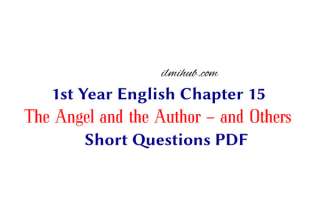In this post, I am sharing 1st Year English Leisure Poem Explanation of Lines with Reference to the Context Notes for Class 11. Leisure Poem by W.H Davies is a very well-known poem and included in 11th English Textbook 3 at No.11. I have taken these Leisure Poem Explanation notes from Kips Notes. In Leisure Poem, the poet has beautifully described that in the modren age we are so busy in our daily routines and worldly earnings that we do not have time to enjoy nature. At ilmihub, I have already shared 11th English All Poems notes. Intermediate Part 1 students should visit this post for 1st Year English Book 1 Short Stories notes.
Poem 11 Leisure by William Henry Davies Explanation with Reference to the Context
Reference
These Lines has been taken from the poem, “Leisure” by W.H Davies.
Context
Nature stands for purification and enrichment of our souls. But our mechanical haste and modern lifestyle have made our life poor by spoiling our peace of mind and depriving us of aesthetic pleasure.
Explanation of Lines (1 – 2)
It is an ironic poem. The poet laments over the life we are living without enjoying the beauty of nature. According to the poet if there is no spare time to enjoy nature, life is worthless and charmless. Cares and worries ruin the beauty of life. A contact with nature is the secret of a happy life. The modern man is busy in materialistic pursuits. His mechanical life has deprived him of the beauty of nature.
Critical Appreciation
Here the poet uses a figure of speech alliteration ‘stand and stare’. Alliteration is the repeated us e of consonants especially at the beginning of words as in stand and stare. The rhyme scheme in these lines is a, a.
Explanation of Lines (3 – 4)
The poet compares man with animals like cow and sheep. He says that even animals are lucky enough to enjoy the beauty of nature. Man, who is the crown of all creatures, does not understand the importance of nature and its effect on human beings. Animals are fortunate enough to live in nature and enjoy it as long as they wish. They find enough time to stand under the trees and gaze at the bounteous beauty of nature for a long time.
Critical Appreciation
The poet has used the alliteration of ‘b’ sound in the phrase ‘beneath the boughs’ to give place to man along with nature. The rhyme scheme in these lines is a, a.
Explanation of Lines (5 – 6)
The poet criticizes man’s unavailability of spare time. He says that nature is enchanting in each and every form. At night the captivating phenomenon of twinkling stars and at day time streams present the scene of stars twinkling in the depths of water. But, it is pity that modern man enjoys the phenomenon neither at night nor in full light of the day.
Critical Appreciation
The poet has used the alliteration of ‘s’ sound in the phrase ‘streams full of stars like skies at night’ to integrate different objects of nature. The rhyme scheme in these lines is a, a.
Explanation of Lines (7 – 8)
Beauty I the name of proportion and ‘a thing of beauty is a joy forever.’ Here the poet personifies beauty as it starts with capital B. Personification is a figure of speech in which human qualities are given to non-living things. The poet presents Beauty as a woman whose rhythmic movements are a constant source of joy. Actually the poet wants to show the proportion in different objects of nature. Modern man does not feel this rhythm and proportion of beauty owing to lack of spare time.
Critical Appreciation
The poet personifies beauty in these lines as he talks about Beauty’s glance and her feet. He gives a human manifestation to beauty in order to emphasize the presence of beauty all around us. The rhyme scheme in these lines is a, a.
Explanation of Lines (9 – 10)
The poet has personified beauty. He narrates the brief but charming phenomenon of her smile that modern man misses. The poet beautifully describes that smile which starts from eyes and reaches lips within no time. But modern man does not have even that short time to enjoy the smiling beauty. According to the poet only a glance at nature refreshes us and fills us with happiness. Our hearts feel beauty through eyes. But the modern man has no time to enjoy the beauty of nature. Helen Keller says, “The seeing see little.”
Critical Appreciation
The poet personifies beauty in these lines as he talks about beauty’s mouth and feet. He gives a human manifestation to beauty in order to emphasize the presence of beauty all around us. The rhyme scheme in these lines is a, a.
Explanation of Lines (11 – 12)
The poet concludes the poem by answering the question that he has posed in the beginning of thepoem. Modern man is busy in materialistic pursuits and does not enjoy nature. His life is worthless and useless. Materialistic pursuits bring tension and depression while nature brings happiness and joy. It heals wounds and sooths heart. A tension free life is worth living.
Critical Appreciation
The poet has used the alliteration of ‘s’ sound in the phrase ‘stand and stare’ to reinforce his idea of man’s relation with nature. The rhyme scheme in these lines is a, a.
Leisure Poem Theme / What Kind of Poem is Leisure?
Leisure is an ironical poem that shows modern man’s mechanized life. His inability to have spare time deprives him of enjoying nature. His cares and worries do not let him enjoy nature. The world is too much with him.
Relevant Notes
- 1st Year English Notes
- 11th Textbooks PDF Download
- Leisure Poem MCQs & Synonyms
- Leisure Poem Short Questions





